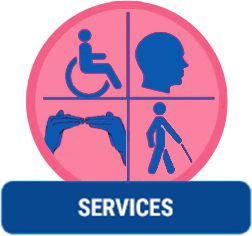Watch how to sign ‘treasurer’ in American Sign Language
TADASHI “TAD” TANAKA (1932-2008) – DMC Original Board Treasurer
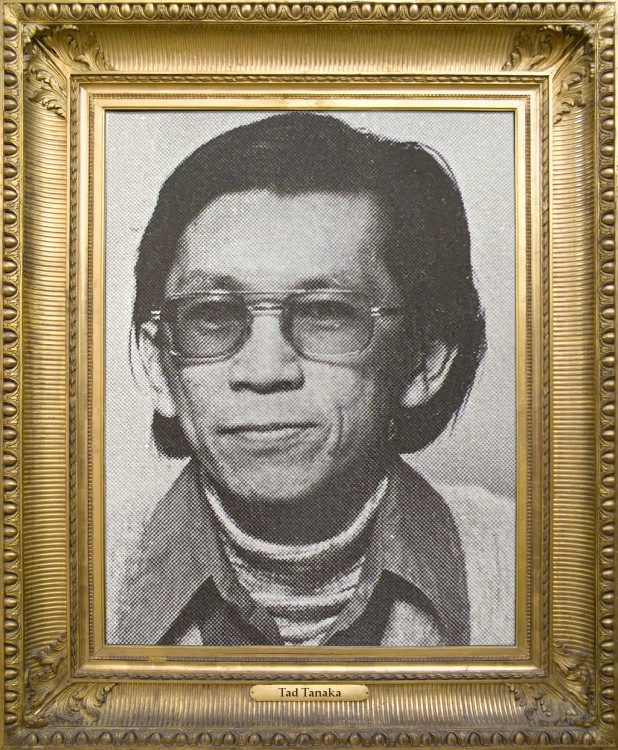
New Year’s Day is a day when people plan ahead with forward-thinking about the future and what the year ahead holds in store. For Tadashi “Tad” Tanaka, this was his destiny as a New Year’s baby born in 1932 in Santa Paula, California.
Born to a Japanese family of farmers during the Great Depression Era, it would seem natural to plan for the future, as that is what farmers do, seasonably planting ahead for what would bring fruits of their labor in the future. Though nothing could prepare Tanaka to process the death of his father, being raised with his younger sister by his now-widowed mother and enduring the WWII Japanese Internment Camps all before formative high school years. From the two-city block Fresno fairgrounds area was transformed into barb-wire fenced areas with guard towers, leaving Tanaka and his family sleeping in Army barrack quarters with poorly designed toilet facilities. Tanaka went three different relocation centers during the war. From Fresno, to Arkansas and later transported to Gila River, Arizona, thinking about ‘the future’ seemed bleak after hearing native Californians like himself returning to nothing upon the war ending, with dreams shattered and homes destroyed.
Though upon returning home to begin his high school years, he didn’t fade away into the shadows amid some racism and an uncertain future, keeping his head focused pursuing his next chapter. As a senior at Central High School in Fresno he was on the Future Farmers of America (FFA) Honor Roll, holding the office of Treasurer in the campus FFA Agriculture group and active in Auto Shop with a bright leadership future ahead of him. Shortly, just after graduation, his life changed as a motorcycle accident left him as a quadriplegic in a wheelchair.
After several dead-ends finding solutions for his spinal cord situation, zero access to any real traditional rehabilitation program, he found research and education were only just beginning to expose him to what limited resources he had as a member of the disability community. Rejected from receiving educational assistance, declared ‘not disabled enough,’ Tanaka spent time soul-searching, tending to the agricultural landscape of his mind reading an endless stream of books after a frustrating five-month hospital stay. Once he was in the presence of other quadriplegics, he began to learn he was not alone despite his lengthy time of isolation, reigniting new sparks to see what could be possible to achieve, and decided to do something about the obstacles which presented themselves through his newfound community.
Enrolling in Fresno State University, he faced many challenges with accessibility. He acknowledged every bit of help from fellow students expressing his gratitude to them publicly with letters to the editor of the Fresno Bee thanking them for helping lift his wheelchair up two flights of stairs.
In 1963, Tanaka didn’t realize it at the time, but this is where his own personal journey became a professional one in activism.
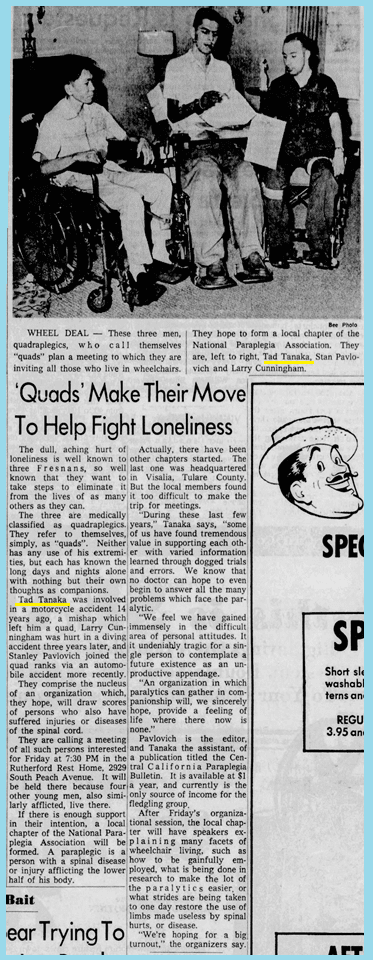
His advocacy began September 11, 1963 as shown in this article printed in the Fresno Bee Newspaper when he, Larry Cunningham and Stanley Pavlovich, also quadriplegics joined forces as a loneliness support group. The three of them put their intention out into the community publicly through the local newspaper. It was then the National Paraplegia Foundation local chapter in Fresno was founded. Together they also started the Central California Paraplegia Bulletin.
Tanaka started a new trek from Fresno to Long Beach with his mobile home to Southern California, and graduated with a B.A. degree in Psychology in 1971 from Cal State University, Long Beach. He followed up his studies with a graduate degree in Public Health. In 1972, began a services program for disabled students on campus as a member of the Concerned Handicapped Students group where he continued to become an activist for disability rights, including calling out how audio recorder assistance was not universally available to assist the blind. He also fought for there to be full faculties who were specifically knowledgeable of the needs for severely disabled students to provide solutions and support.
He was often the spokesperson interviewed by CSULB’s campus journalists, which later expanded to local newspapers like the Long Beach Press Telegram, magazines and other college campus publications uniting students and local community leaders in discussion about access, independents and rights for people with disabilities. Tanaka went on to working with the local chapter of California Association of the Physically Handicapped (CAPH) and participated at many of their conferences as a panel speaker and keynote throughout his career an advocacy and activism.
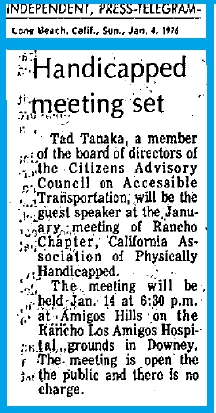
He spent much of his time devoted to the reinstatement of California’s Attendant Care Program. His work continued sitting on the Board of Directors as Treasurer for the Committee for the Rights of the Disabled, Rancho Chapter in Downey, California. He was a member of the California Association for the Physically Handicapped. Through the above speaking engagement as a Board Member on the Citizens Advisory Council on Accessible Transportation, he was introduced to the advocacy that Greg Winterbottom was doing working as an assistant to the Orange County Board of Supervisors and reunited with many of mutual connections with Premo.
Tanaka was also active on the Citizens Advisory Council Board and part of the active fight with National Rehab Association bringing awareness for accessibility needs calling out for economic incentives to create the movement toward action to assist with curbs and steep ramps. This was something he was passionate about, recalling his tough days in Fresno where he had to have fellow students help him lift his wheelchair onto curbs in order to get to his academic classes.
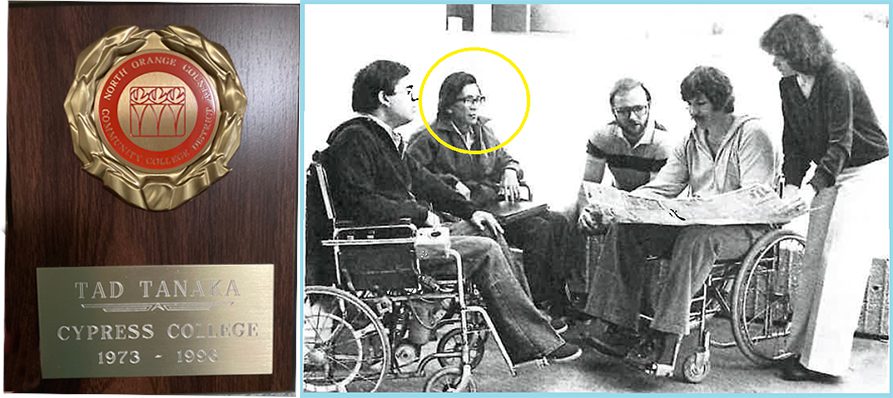
In 1973, he worked at Cypress College’s Roosevelt Center which had only recently opened in 1971 to provide equal access to students with disabilities. Shortly after, in 1973, the Rehabilitation Act was passed, and for the first time in history, civil rights of people with disabilities were protected by law. He remained loyal with his advocacy, helping to give his students access to opportunity and to have a voice. Loyalty and commitment were all part of Tanaka’s investment, passion and hard work in everything he did. From his early advocacy days in Central California to Orange County and Los Angeles County – he created actionable solutions in accessibility. He was awarded the Chamber Commerce Award for service in Los Angeles County.
As a member of the Orange County Department of Social Services Advisory Committee and one of the active founding officers of the Board, Tanaka is quoted as saying, “I strongly feel that if all disabled individuals, regardless of type of disability are to have an equal opportunity towards becoming self-sufficient, and effective resource and advocate agency such as DMC is clearly needed and must be heavily supported by all who may be concerned.”
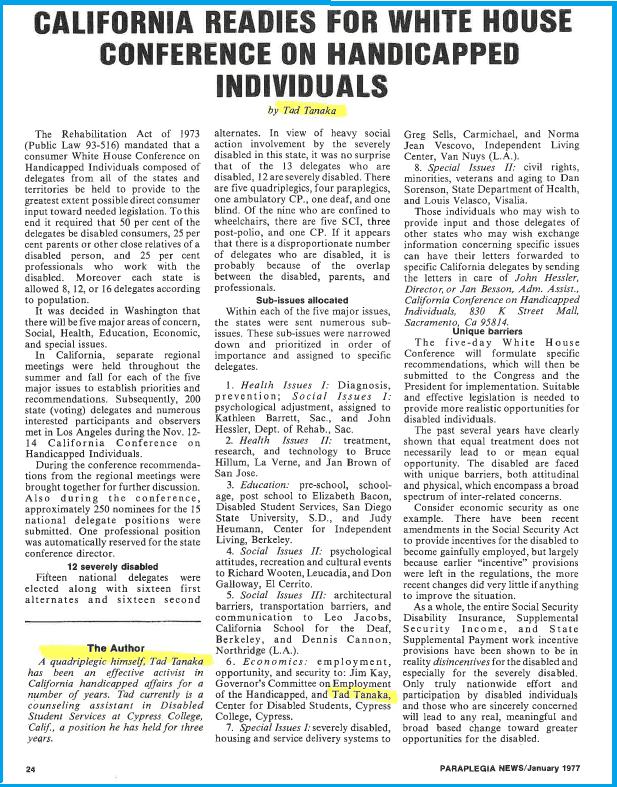
Just ten months before Dayle McIntosh Center would open its doors, Tad Tanaka, who is working for the Roosevelt Center at Cypress College as a counseling assistant takes to leadership and citizen journalism penning an article for Paraplegia News January 1977 issue.
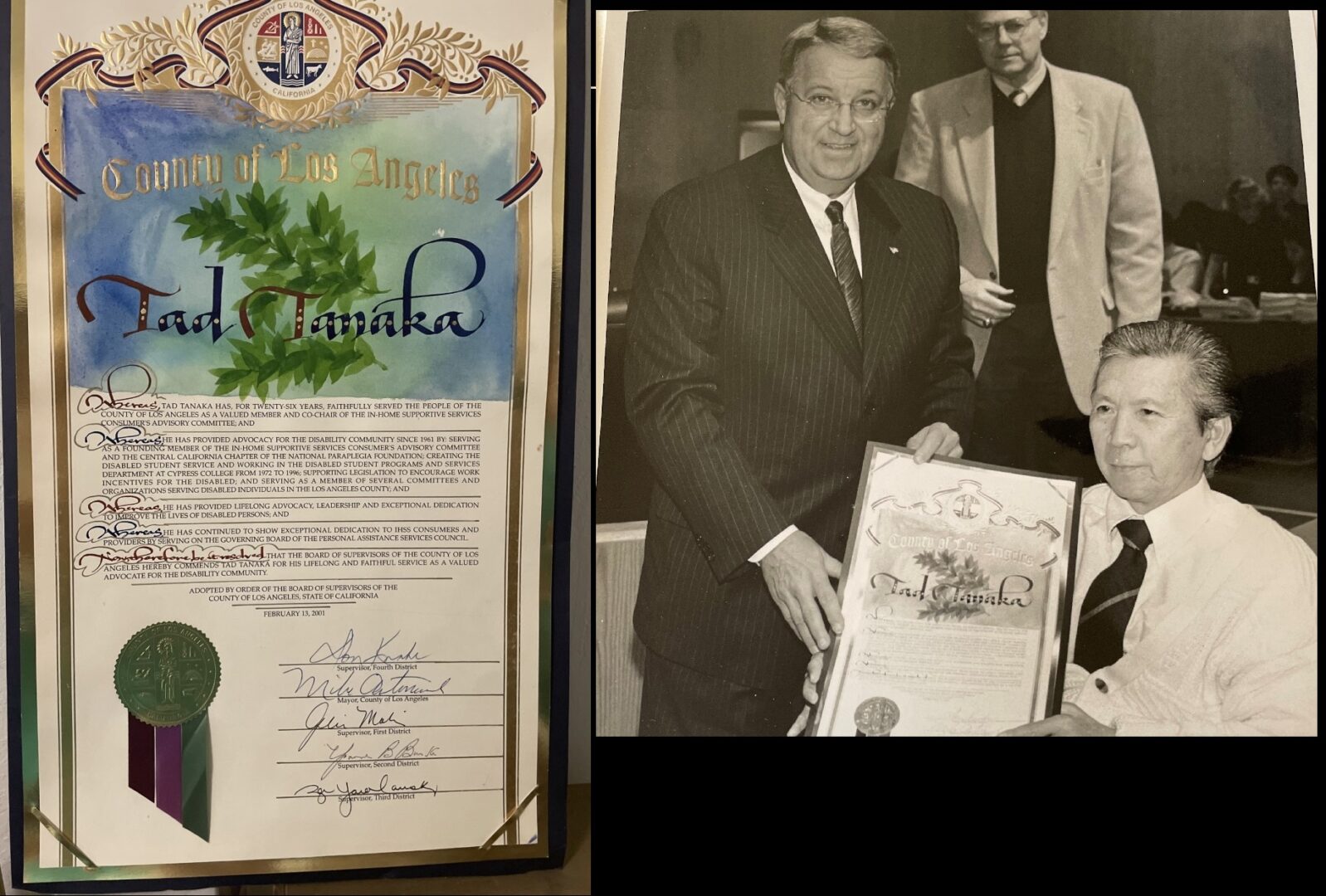
The Proclamation reads:
Whereas, Tad Tanaka has, for twenty-six years faithfully served the people of the County of Los Angeles as a valued member and Co-Chair of the In-Home Supportive Services Consumer’s Advisory Committee; and
Whereas, he has provided advocacy for the disability community since 1961 by: Serving as a founding member of the In-Home Support Services consumer’s Advisory Committee and the Central California Chapter of the National Paraplegia Foundation; Creating the Disabled Student Service and working in the Disabled Student Programs and Services Department at Cypress College from 1972-1996; Supporting legislation to encourage work incentives for the disabled; and serving as a member of several committees and organizations serving disabled individuals in the Los Angeles County; and
Whereas, he has provided lifelong advocacy, leadership and exceptional dedication to improve the lives of disabled persons; and
Whereas, he has continued to show exceptional dedication to IHSS Consumers and providers by serving on the governing Board of the Personal Assistance Services Council.
Therefore be it resolved that the Board of Supervisors of the County of Los Angeles Hereby commends Tad Tanaka for his lifelong and faithful services as a valued advocate for the disability Community. Adopted by order of the Board of Supervisors of County Los Angeles, State of California, February 13, 2001.
Tanaka served as a Board Member for West Side Community Independent Living and in 1976 was one of sixteen elected delegates from California to the White House Conference on the disabled. From talking with the U.S. Department of Health, Education and Welfare about welfare reform to fighting disincentives.
His activism as Legislative Chairman for the Handicapped Students Coalition ensured voices heard across California State Colleges and Universities for disability rights.
Tanaka became one of the original founding Board of Director Officers of The Dayle McIntosh Center, serving as Treasurer. His activism continued on the local, regional and state level until his death May 18, 2008 in Kingsburg, California.





